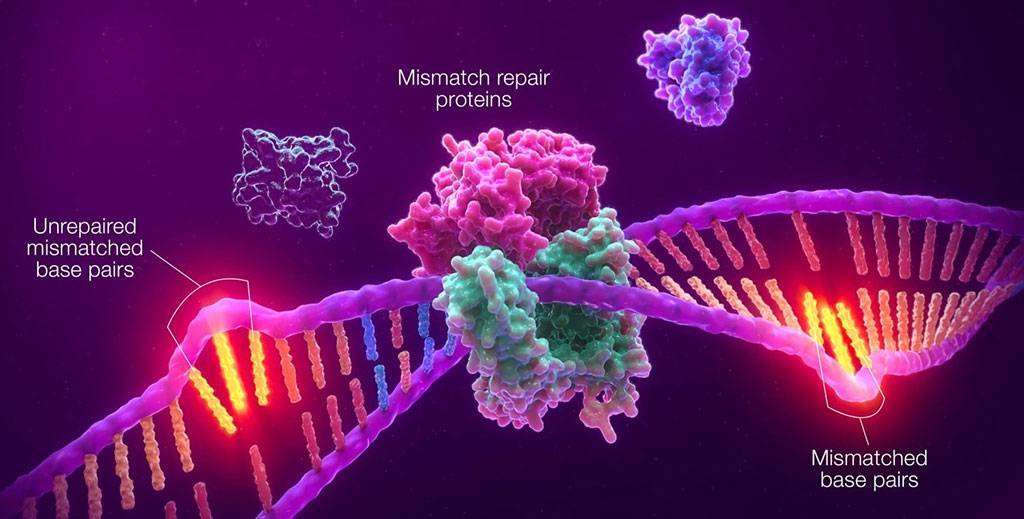Long Mononucleotide Repeat Markers Validated for Microsatellite Instability Detection
By LabMedica International staff writers
Posted on 12 Jan 2022
Mismatch repair deficiency (dMMR) predicts response to immune checkpoint inhibitor therapy in solid tumors. Long mononucleotide repeat (LMR) markers may improve the interpretation of microsatellite instability (MSI) assays. Posted on 12 Jan 2022
Normally, mismatch repair (MMR) proteins recognize and repair these errors immediately after DNA replication. However, in MMR deficient cells, these errors go unrecognized and remain unrepaired, resulting in novel microsatellite length alleles, or microsatellite instability. dMMR assays are used to screen cancer patients for Lynch syndrome and immune checkpoint inhibitor therapy.

Image: The Promega MSI Analysis System V1.2 and the LMR-MSI systems are PCR-based methods for detecting microsatellite instability (MSI) in solid tumors (Photo courtesy of Promega)
Oncologists at the Johns Hopkins University School of Medicine (Baltimore, MD, USA) included in a study 48 colorectal cancer (CRC) samples, 66 endometrial cancer (EC) samples, 12 pancreatic cancer (PC) samples, and 22 samples of other cancer types, in addition to 12 MSI-low (MSI-L) samples of various cancer types. Macrodissection of tumor and normal tissues was guided by hematoxylin and eosin–stained sections. DNA was then extracted from formalin-fixed, paraffin-embedded tissue using the tissue preparation system (Siemens Healthineers, Erlangen, Germany). DNA concentrations were quantified using the Qubit fluorometer (Invitrogen, Carlsbad, CA, USA).
Immunohistochemistry (IHC) results for MLH1, MSH2, MSH6, and PMS2 proteins were obtained from surgical pathology reports and were used to define MMR status. Antibody clones included anti-MLH1 (clone M1), anti-MSH2 (clone G219-1129), anti-MSH6 (clone SP93), and anti-PMS2 (clone A16-4), all from Roche/Ventana Medical Systems (Tucson, AZ, USA). All IHC assays were performed on the Ventana Benchmark system. Multiplex PCR amplification of five mononucleotide repeat markers and two pentanucleotide repeat markers was performed using the MSI Analysis System V1.2 and the Long Mononucleotide Repeat (LMR) MSI Analysis System (Promega, Madison, WI, USA). Amplification products were analyzed using an ABI 3130×L or ABI 3500×L capillary electrophoresis instrument (Applied Biosystems, Foster City, CA, USA).
The investigators reported that the sensitivity and specificity of the LMR MSI panel for dMMR detection were both 100% in CRC. The sensitivity values of the MSI V1.2 and LMR MSI panels in EC were 88% and 98%, respectively, and the specificity values were both 100%. The sensitivity of the LMR panel was 75% in dMMR prostate cancer detected by immunohistochemistry. The 22 samples of other cancer types that were previously classified as MSI-high (MSI-H) were also classified as MSI-H using the LMR MSI panel. For the 12 samples that were previously classified as MSI-low (MSI-L), one sample was classified as microsatellite stable using the LMR MSI panel, eight as MSI-L, and three as MSI-H.
The authors concluded that the LMR MSI panel showed high concordance to the MSI V1.2 panel in CRC and greater sensitivity in EC. The LMR MSI panel improves dMMR detection in non-colorectal cancers. The study was published on December 02, 2021 in The Journal of Molecular Diagnosis.
Related Links:
Johns Hopkins University School of Medicine
Siemens Healthineers
Invitrogen
Roche/Ventana Medical Systems
Promega
Applied Biosystems














